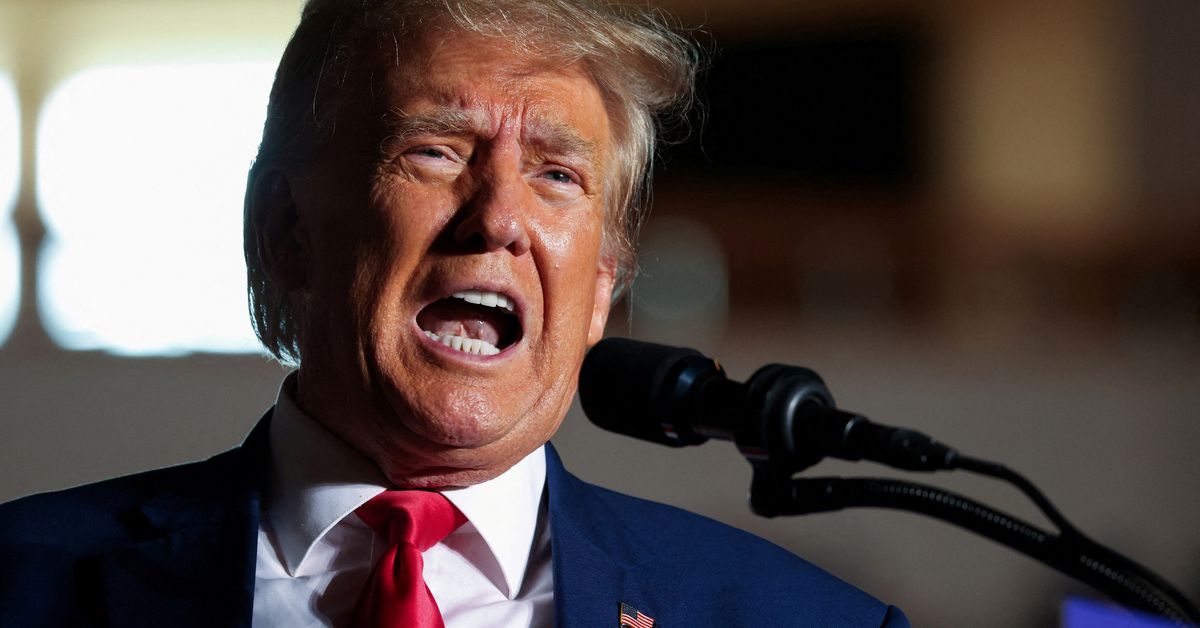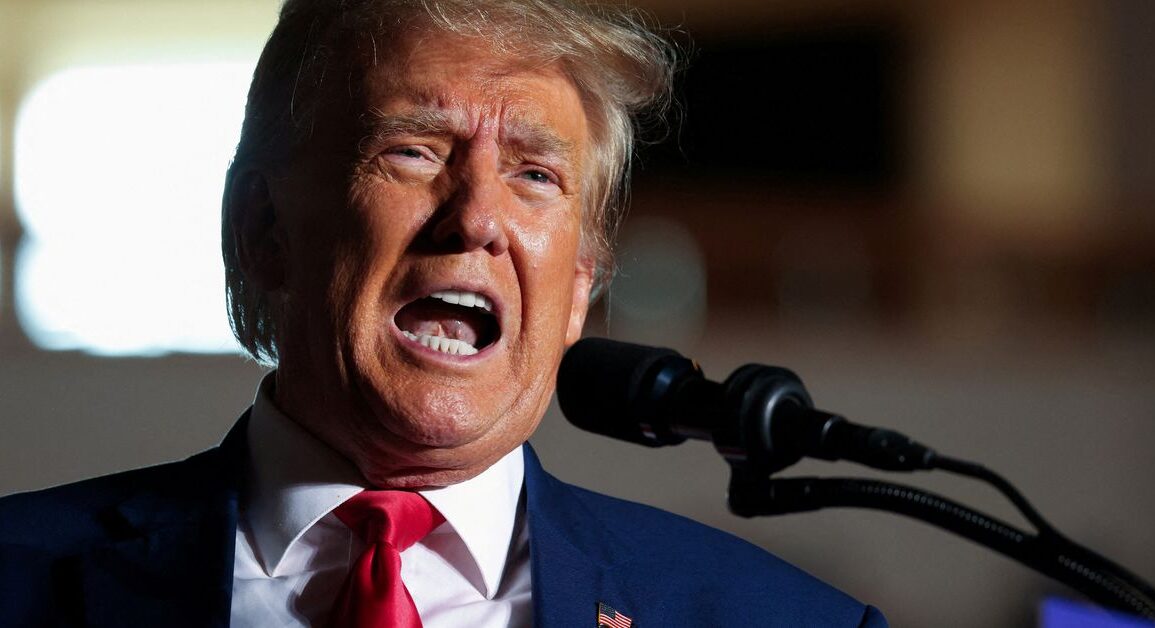
Aug 3 (Reuters) – On March 30, when Donald Trump was indicted over a hush-money payment to a porn star, he already owned the narrative. He had been preparing for this moment.
Four weeks earlier, anticipating the indictment was near, the former president dictated notes to aides for a pugnacious speech – one that would ultimately help reignite his political fortunes, pull away from Republican rival Ron DeSantis and redraw the 2024 race for the White House.
Trump spoke to speechwriters Ross Worthington and Vince Haley on the phone, according to an aide who was also on the call, telling them he wanted to stress two points in his speech: that he was the victim of a two-tiered justice system in which only Republicans were targeted for prosecution; and he was the one person protecting his supporters from being persecuted.
“Today, I am your warrior, I am your justice,” Trump told activists on March 4 in the keynote speech at the Conservative Political Action Conference (CPAC) in Maryland. “And for those who have been wronged and betrayed, I am your retribution.”
The crowd erupted into applause and cheers.
For Trump and his team, the response confirmed they had a powerful issue to campaign on and that when the New York indictment came, they would embrace it, according to the aide, speaking on condition of anonymity to discuss internal campaign strategy.
“There wasn’t any second guessing. It was full charge ahead,” the aide told Reuters.
Worthington and Haley didn’t respond to requests for comment.
The story of this pivotal moment in the Republican election contest, when Trump’s indictment and his decision to campaign on it changed the dynamic of the race, is based on interviews with 11 people including Trump team members and party strategists, plus reviews of polling and fundraising data.
The events offer a window into the thinking of Trump and his team as the former president grapples with a new federal indictment, unveiled on Tuesday, over his efforts to overturn the 2020 election.
By March 30, when Manhattan District Attorney Alvin Bragg asked a grand jury to charge Trump over the hush-money payment, the former TV showman had already convinced his base he was being persecuted, regained dominance of 2024 media coverage and begun raising millions of dollars off his impending indictment.
Many Trump voters who just weeks before had told Reuters and other new outlets they were tired of the drama surrounding him and were considering an alternative, flocked backed to his side. His Republican rivals were forced to back him, too, or risk the wrath of his supporters, who they were trying to woo.
Less than two hours after news of the charges broke, Trump’s campaign blasted out an email to supporters seeking donations, titled: BREAKING: PRESIDENT TRUMP INDICTED. “The Radical Left – the enemy of the hard-working men and women of this country – have INDICTED me in a disgusting witch hunt,” the email said.
Trump has provided no evidence to support his claims that the prosecutions against him are politically motivated.
In the week following the indictment, the campaign sent out 34 fundraising emails directly referencing the criminal charges, according to a Reuters review of campaign communications. More than $13 million was raised in that period, his campaign said.
“The indictment has definitely been an accelerant for him,” said Chris Jackson, a public opinion researcher at polling firm Ipsos, which conducts polls for Reuters and other media organizations. “It really seemed to suck the oxygen out of the rest of the Republican field and back to Trump.”
Tuesday’s indictment of Trump was the third in four months. He was also hit in June with federal charges for risking the country’s most sensitive security secrets with his handling of classified documents. The latest indictment, and possible separate charges over Trump’s effort to overturn the 2020 election result in Georgia, could test the former president’s ability to turn scandal into support.
TRUMP WIDENS LEAD ON DESANTIS
Internally, Trump’s campaign first saw a rise in his polling numbers in mid-February following his trip to East Palestine, Ohio in a show of support after a train derailment and toxic chemical spill there.
But Reuters/Ipsos polling numbers show Trump’s lead over his nearest rival, Florida Governor Ron DeSantis, widened from 14 to 26 percentage points in the days after Trump was indicted.
In a March 14-20 survey, Trump’s 44% share of party support compared with DeSantis’ 30%. Following the indictment, Trump’s support rose to 49% in an April 21-24 survey while DeSantis slipped to 23%.
That dynamic has held. The most recent Reuters/Ipsos poll, conducted July 11-17, showed Trump with 47% support, nearly 30 points above DeSantis’ 19%.
Republicans in the latest poll were asked to consider how “the criminal cases against Donald Trump impact your likelihood of voting for him.” About 30% said they were more likely to vote for him, versus 20% who were less likely to do so and 48% who said the cases had no impact.
Prosecutors in the Manhattan DA’s office who had worked on investigations of Trump in recent years understood the possibility that an indictment would play to Trump’s electoral advantage, according to a person familiar with the matter, who declined to be named due to the sensitivity of the issue.
But it was never a factor in the decision-making process when prosecutors discussed the merits of bringing a case, according to the person. The person wasn’t familiar with Bragg’s thinking when he sought the indictment and didn’t know if his team foresaw that it could boost Trump.
A spokeswoman for the Manhattan District Attorney’s office declined to comment for the story. Bragg has rejected allegations that the charges were politically driven.
STORMY DANIELS PAYMENT
The surge of support was timely for Trump.
His reputation before the indictment had taken a battering among many Republicans who blamed his endorsement of right-wing candidates in battleground contests for the party’s poorer-than-expected showing in the 2022 midterm elections.
The former president pleaded not guilty on April 4 to 34 counts of falsifying business records to conceal reimbursements to his then-lawyer Michael Cohen for a $130,000 payment to porn star Stormy Daniels to stay quiet about an alleged sexual liaison, which Trump denies.
Prosecutors say Trump falsified records related to reimbursing Cohen in part to cover up that the payment to Daniels exceeded federal campaign contribution limits when he was running for president in 2016.
In June following the classified document indictment, Trump’s share of Republican support briefly dipped to 43% in a June 9-12 Reuters/Ipsos poll, but rebounded back to 47% in July.
‘HARM AT GENERAL ELECTION’
Some strategists say that while Trump has successfully capitalized on his legal woes so far, they could harm his prospects if he becomes the Republican nominee next year.
“That which helps in a primary might harm in a general election,” said Adam Geller, a Republican pollster. Geller said Trump’s mounting criminal indictments might turn off independents and more moderate Republicans, voters he will need to become president again.
Indeed, in the July Reuters/Ipsos poll, 37% of independents said the criminal cases against Trump made them less likely to vote for him for president, compared with 8% who said they were more likely to do so, and 41% who said the cases had no impact, with the rest were unsure.
Also, Trump’s ability to raise money off his legal problems could have a ceiling. His strongest fundraising days of this year came immediately after his first indictment. He raised much less money in the days after his second indictment, according to campaign finance disclosures.
Hours after appearing in a Miami court on June 13 to plead not guilty in the classified documents case, Trump flew to his golf club in Bedminster, New Jersey and delivered a speech in which he decried a “political prosecution.”
After the speech he retired to the club’s Green Room, an opulent meeting room with chandeliers and olive-colored walls, where he conferred with key advisers, the Trump aide said.
After a day in which he had been booked and fingerprinted, Trump was not dejected by his mounting legal woes. Instead, he was excited and wanted to schedule more campaign events.
“He was energized and fired up,” the aide said.
Our Standards: The Thomson Reuters Trust Principles.
This post was originally published on this site be sure to check out more of their content.







